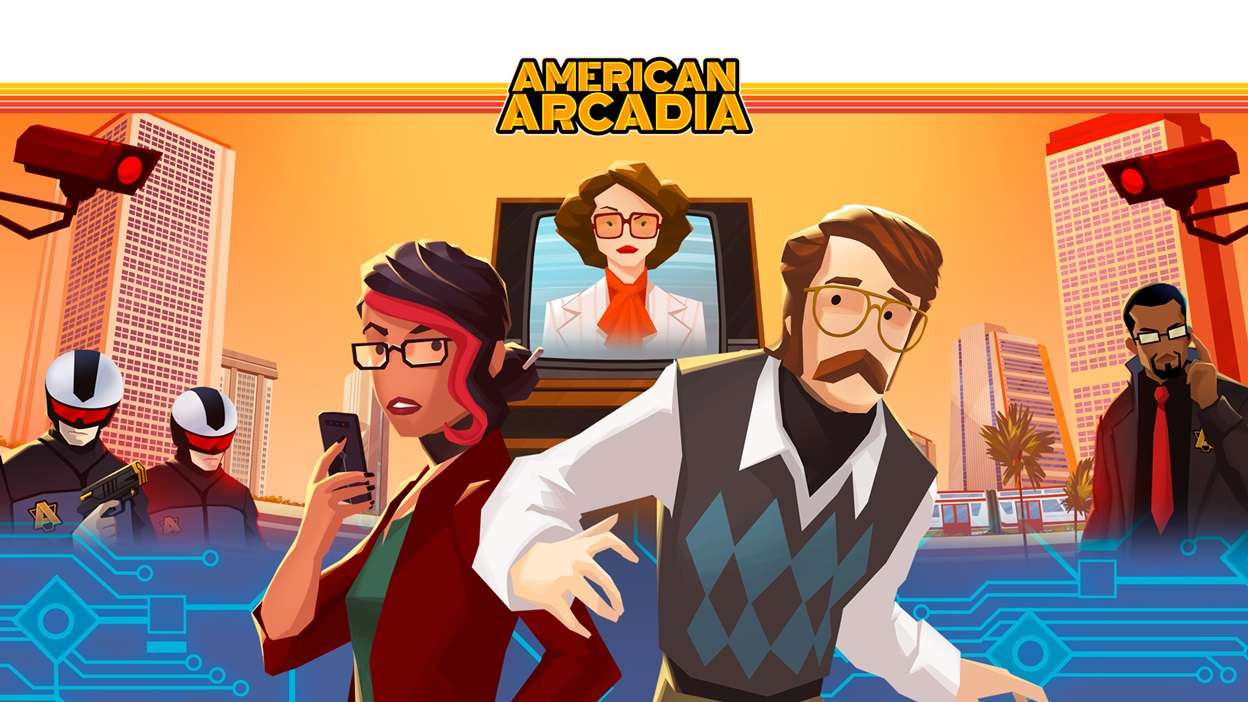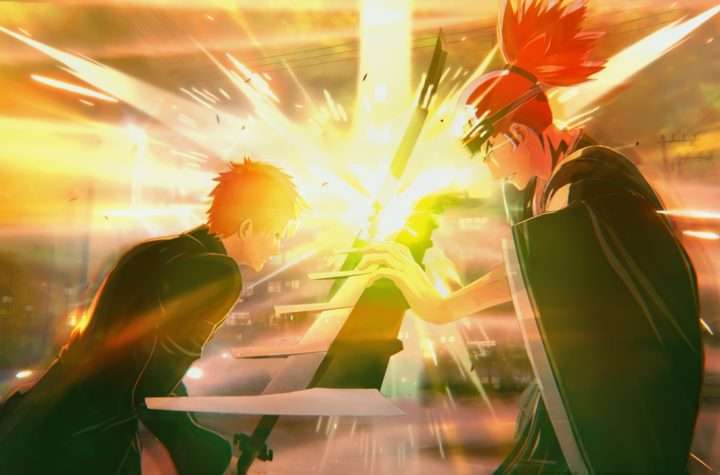Side-scrolling puzzle platformers are nothing new. American Arcadia, from developer Out of the Blue Games and published by Raw Fury, seems to play into this in a tongue-in-cheek sort of way. The city of Arcadia is from another time, its fashion, technology, and overall aesthetic straight out of the 1970s. It’s playfully using a style out of vogue to subvert this apparent age with its twist gimmick: the city is an elaborate set for a reality show, unbeknownst to its citizens. Through this split worlds concept, American Arcadia promises an original take on narrative puzzle games, but fails to deliver much more than a run-of-the-mill experience. A well-executed and stylish one, yes, but it feels outdated nonetheless.
Trevor Hills, our first protagonist, is the epitome of the everyman: his mundane life is nothing more than work, sleep, and television. The first interesting thing to happen in his proximity is Gus, a coworker, winning a free vacation package. But before he has a chance to follow suit, a mysterious companion warns him of the true nature of Arcadia’s “travel agents”: they’re going to kill him, because he’s not contributing to ratings the way they want. This ominous voice, later revealed to be our deuteragonist Angela, guides Trevor through the backrooms of this life-sized set. Her introduction establishes the vibe of the game going forward: two characters from opposite worlds working together to escape.

The gameplay split allows players to control Angela in a radically different fashion than Trevor: her sections are a first-person investigation in a corporate tower, manipulating Arcadia from the outside to further Trevor’s escape. Her life is part spy thriller, part workplace drama, a radical departure from the sitcom-esque backdrop of Trevor’s fake world. Fortunately, her introduction also breaks Trevor out of his standard puzzle-platformer shenanigans. Angela’s access to CCTV monitors all around Arcadia lets players manipulate scene elements out of Trevor’s control: doors, elevators, cranes, and quite a bit more. The puzzles were never too demanding, as the interactable elements all had bright blue buttons on them, but I vastly prefer that to desperately clicking everything in a scene to find the obscure intended solution.
Because of low difficulty and frequent checkpoints in the gameplay, American Arcadia has little in the way of narrative stakes; we can rest assured from the start that our heroes will be successful. But this game clearly isn’t going for stakes. Its dialogue is full of jokes, especially the filler lines for examining optional items. While none of them quite landed for me, they definitely contributed to the game’s overall atmosphere, which is mostly cohesive. The scenes focusing solely on Trevor can feel over-reaching at times, like they were taken from a story with a gravity simply not present here. Those scenes are more frequent than I would like, but certainly not a total buzzkill.
For as critical as I may be of American Arcadia, its visuals are certainly a strong suit. The vibrant colors of the city are nothing if not pleasing, but hollow in a way bordering on uncanny: the perfect aesthetic for what is, ultimately, a lifeless set. But what I found much more interesting was exploring the areas not meant for the diegetic audience. Arcadia’s backrooms are introduced to us when Angela breaks Trevor into the “supercomputer room” of his office, which is massive and empty, save for thousands of employee memos piled up against every wall. The spaces out of view are abandoned and unsettling—offices with seated mannequins, ornate rooms with a single floodlight and heavy metal doors—and while this is by no means the primary setting for the game, it is the most unique, and as well executed as the rest.
With simple puzzles, a particular sense of humor, and style to spare, American Arcadia is a light-hearted romp through a wacky premise, and nothing more.
American Arcadia is available for PC via Steam. You can download the demo for free right now.
For more information, visit www.AmericanArcadiaGame.com, and follow the game on Twitter and Instagram for the latest news and updates.
Related: Reviews by John D’Auria

Video games are my personal favorite art medium by far. I love how many ways an interactive story can be told, and I can't stop myself from getting hooked on a good puzzle. I'm a student majoring in game design and music, so I hope to make creative work a part of my life going forward.





More Stories
Warrior Prime Minister Lidia Sobieska Makes a Comeback in TEKKEN 8 at DLC
Wuthering Waves Open-World Action RPG Releases Second Half of Version 1.1. Update
Trash Goblin Demo Impressions for Steam